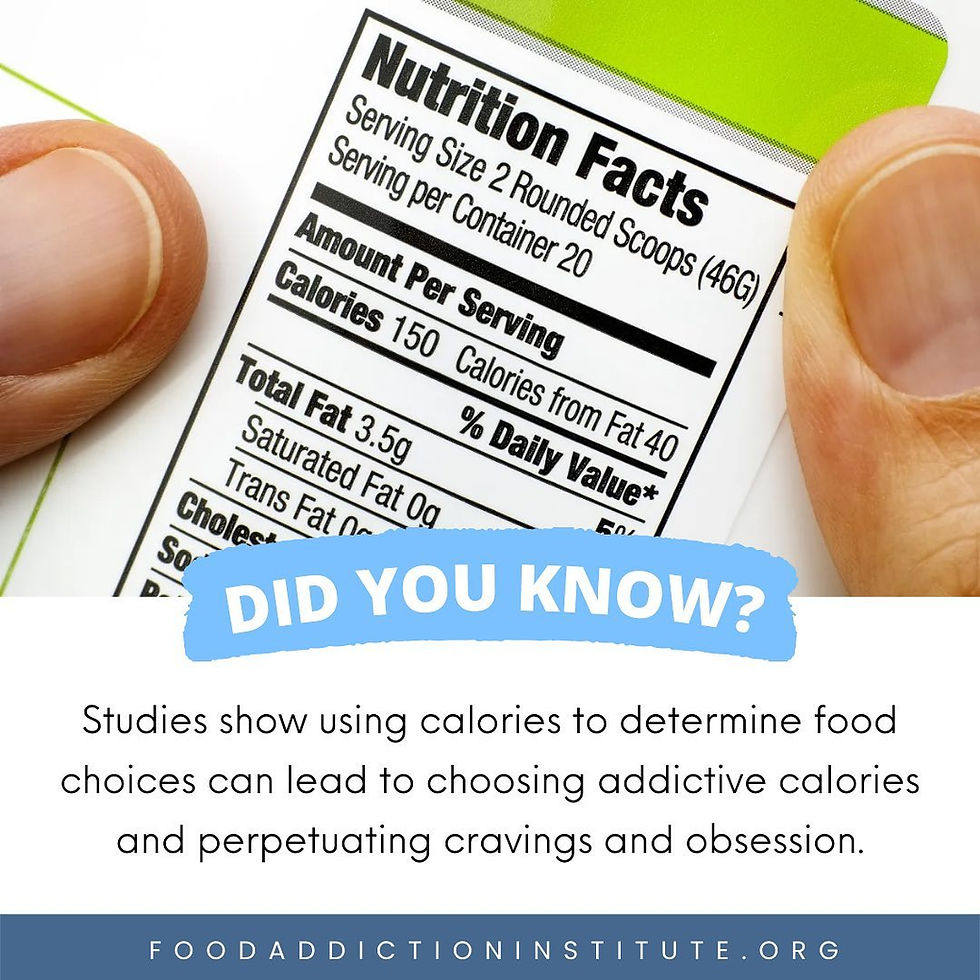Food Addiction And Recovery From Substance Misuse
- Jul 7, 2023
- 3 min read
Updated: Apr 25, 2024

A recent study investigated how recovery from substance misuse affects three psychological concepts:
temporal discounting,
hedonic hunger, and
food addiction.
What Is Substance Misuse?
Substance misuse is the harmful use of drugs or alcohol that can cause physical or mental health problems. Recovery from substance misuse is the process of overcoming the negative effects of substance misuse and restoring one's well-being.
What is Temporal Discounting?
Temporal discounting is the tendency to prefer smaller immediate rewards over larger delayed rewards. It reflects how much people value the present over the future.
For example, someone with high temporal discounting may choose to smoke a cigarette now rather than wait for a healthier future. Temporal discounting can affect decision-making and self-control in various domains, such as health, finance, and education.
What is Hedonic Hunger?
Hedonic hunger is the desire to eat for pleasure rather than for physiological needs. It reflects how much people are influenced by the sensory and emotional aspects of food, such as taste, smell, and mood.
For example, someone with high hedonic hunger may crave a slice of cake even when they are not hungry. Hedonic hunger can affect eating behavior and weight management, as well as psychological well-being.
Food Addiction As Defined in Study
Food addiction is the loss of control over eating behavior and the development of withdrawal symptoms when abstaining from certain foods. It reflects how much people are dependent on food as a source of reward and relief.
For example, someone with food addiction may binge on chocolate and feel anxious or depressed when they try to stop. Food addiction can lead to obesity and other health problems, as well as social and emotional difficulties.
Who was studied?
The study involved 60 participants who were either in active recovery from substance misuse (n = 30) or had no history of substance misuse (n = 30). The researchers measured their temporal discounting, hedonic hunger, and food addiction using standardized questionnaires and tasks. They also assessed their body mass index (BMI) and eating disorder symptoms.
What did results show?
The results showed that participants in recovery had higher temporal discounting, hedonic hunger, and food addiction than participants without substance misuse history. They also had higher BMI and more eating disorder symptoms.
The researchers suggested that these findings may reflect a shift in reward-seeking behavior from substances to food during recovery, as well as a difficulty in regulating impulses and emotions. They also proposed that temporal discounting, hedonic hunger, and food addiction may be potential risk factors for relapse and poor recovery outcomes.
What are the implications?
The study has important implications for the treatment and prevention of substance misuse and eating disorders.
It highlights the need to address the underlying psychological mechanisms that drive addictive behaviors, such as temporal discounting and hedonic hunger.
It also suggests that interventions that target food addiction and promote healthy eating habits may be beneficial for people in recovery from substance misuse.
Study Abstract
Substance use disorders (SUDs) and obesity are both chronic, relapsing, remitting disorders that arise from a heightened preference for immediate-focused rewards (i.e., steep temporal discounting). During recovery from SUDs, overweight and obese outcomes are common as individuals may replace drug rewards for food rewards. However, little has been done to investigate the neuropsychological processes underlying food reward and addiction in individuals recovering from SUDs.
Hypothesis
We hypothesized that individuals in recovery from substance misuse would have steeper temporal discounting, an increased drive for palatable foods (i.e., hedonic hunger), and greater food addiction symptoms than non-substance users.
Contrary to our hypotheses, we found that individuals in recovery from SUDs show improved outcomes in temporal discounting, hedonic hunger, and food addiction symptoms.
Moreover, recovery status and temporal discounting significantly predicted these outcomes.
Our findings suggest that the enhanced executive control processes needed for successful SUD recovery may transfer to other reward-related processes such as food reward and consumption.
Basso, J. C., Satyal, M. K., Athamneh, L., & Bickel, W. K. (2022). Changes in temporal discounting, hedonic hunger, and food addiction during recovery from substance misuse. Appetite, 169, 105834. https://doi.org/10.1016/j.appet.2021.105834
Become a supporting member of FAI to read the full research document and gain access to the FAI research archive.




Comments